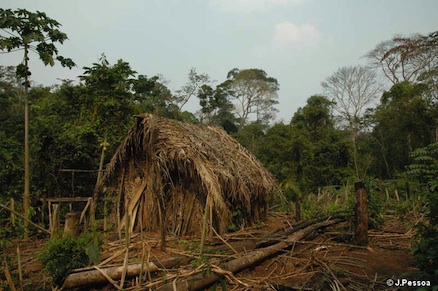De Pueblos Indígenas en Brasil
The printable version is no longer supported and may have rendering errors. Please update your browser bookmarks and please use the default browser print function instead.
Noticias
Last survivor of uncontacted Amazon tribe attacked
09/12/2009
Fonte: Survival International - http://www.survivalinternational.org/news/5344
The last survivor of an unknown and uncontacted Amazon tribe has been targeted by gunmen.
The incident took place last month in Tanarú, an indigenous territory in the Amazon state of Rondônia, Brazil, but the news has only just emerged.
It is not known whether the Indian was in the direct line of fire or whether the shots were designed to scare him away. Ranchers in the area oppose government efforts to protect the man's land, and are the most likely perpetrators.
Officials from FUNAI, Brazil's Indian affairs department, discovered that its protection post had been ransacked and found empty shotgun cartridges nearby in the forest.
The police have investigated the incident, but nobody has been charged for illegal entry.
Altair Algayer, a FUNAI official, said, 'This is a serious situation. The Indian's life is being put in danger by the interests of the ranchers'.
FUNAI believes that the 'Man of the Hole' has survived the attack.
This name refers to the deep holes he builds to trap animals and to hide in. It is believed he is the only survivor of a tribe massacred by ranchers in the 1970s and 1980s.
The only known images of the 'Man of the Hole' were fleetingly captured by filmmaker Vincent Carelli in his film 'Corumbiara' which documents the genocide of the Akuntsu and other tribes in the region.
Stephen Corry, director of Survival, said today, 'His tribe has been massacred and now the 'Man of the Hole' faces the same fate. The ranchers must allow this man to live out his last days in peace on his own land, and the authorities must do all they can to protect it'.
Survival's Research Director Fiona Watson has been to the region and is available for interview
The incident took place last month in Tanarú, an indigenous territory in the Amazon state of Rondônia, Brazil, but the news has only just emerged.
It is not known whether the Indian was in the direct line of fire or whether the shots were designed to scare him away. Ranchers in the area oppose government efforts to protect the man's land, and are the most likely perpetrators.
Officials from FUNAI, Brazil's Indian affairs department, discovered that its protection post had been ransacked and found empty shotgun cartridges nearby in the forest.
The police have investigated the incident, but nobody has been charged for illegal entry.
Altair Algayer, a FUNAI official, said, 'This is a serious situation. The Indian's life is being put in danger by the interests of the ranchers'.
FUNAI believes that the 'Man of the Hole' has survived the attack.
This name refers to the deep holes he builds to trap animals and to hide in. It is believed he is the only survivor of a tribe massacred by ranchers in the 1970s and 1980s.
The only known images of the 'Man of the Hole' were fleetingly captured by filmmaker Vincent Carelli in his film 'Corumbiara' which documents the genocide of the Akuntsu and other tribes in the region.
Stephen Corry, director of Survival, said today, 'His tribe has been massacred and now the 'Man of the Hole' faces the same fate. The ranchers must allow this man to live out his last days in peace on his own land, and the authorities must do all they can to protect it'.
Survival's Research Director Fiona Watson has been to the region and is available for interview
Las noticias publicadas en el sitio Povos Indígenas do Brasil (Pueblos Indígenas del Brasil) son investigadas en forma diaria a partir de fuentes diferentes y transcriptas tal cual se presentan en su canal de origen. El Instituto Socioambiental no se responsabiliza por las opiniones o errores publicados en esos textos. En el caso en el que Usted encuentre alguna inconsistencia en las noticias, por favor, póngase en contacto en forma directa con la fuente mencionada.
